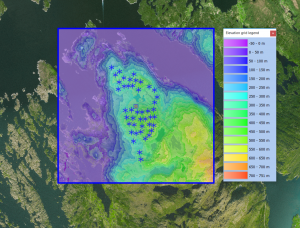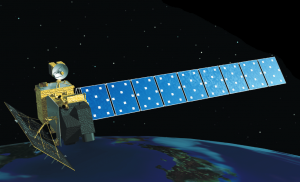Global AW3D30: Difference between revisions
mNo edit summary |
m (→Introduction) |
||
| Line 3: | Line 3: | ||
[[Image:DAICHI.png|right|thumb|300px|ALOS: Advanced Land Observing Satellite "DAICHI". Image credit: JAXA.]] | [[Image:DAICHI.png|right|thumb|300px|ALOS: Advanced Land Observing Satellite "DAICHI". Image credit: JAXA.]] | ||
== Introduction == | == Introduction == | ||
The “ALOS World 3D 30 m mesh (AW3D30) - dataset is recent digital surface model (DSM) with global coverage. The version 2.1 of the dataset was released in early 2018 – and it holds a global coverage in a 30m (1-arc-second) resolution. The dataset was created with the aim for a target vertical accuracy of 5m RMSE – and a horizontal accuracy of 5m. AW3D30 was generated from data obtained from the Panchromatic Remote-sensing Instrument for Stereo Mapping (PRISM) - an instrument that was carried onboard the Japanese Advanced Land Observing Satellite (ALOS). The ALOS satellite was launched on January 24th 2006; it had an expected target life of 5 years. After a successful mission it ended its operations during May 2011 due to a power anomaly. | The “ALOS World 3D 30 m mesh (AW3D30) - dataset is recent digital surface model (DSM) with global coverage. The version 2.1 of the dataset was released in early 2018 – and it holds a global coverage in a 30m (1-arc-second) resolution. The dataset was created with the aim for a target vertical accuracy of 5m RMSE – and a horizontal accuracy of 5m. AW3D30 was generated from data obtained from the Panchromatic Remote-sensing Instrument for Stereo Mapping (PRISM) - an instrument that was carried onboard the Japanese Advanced Land Observing Satellite (ALOS). The ALOS satellite was launched on January 24th 2006; it had an expected target life of 5 years. After a successful mission it ended its operations during May 2011 due to a power anomaly. This dataset was produced by JAXA - Japan's Aerospace Exploration Agency. | ||
== Dataset Experience and Recommendations == | |||
Since the dataset was obtained using optical sensors, then many of the satellite images are covered with clouds. Also areas with low contrast – such as ice and snow - are also problematic for a stereorography approach. | |||
If such problematic errors exists in the imagery, then these cloud or snow/iceareas have been void filled with data from alternative sources – using a such as SRTM3, DEM10 data in Japan or PRISM DSM. | |||
== Accuracy of AW3D30 == | |||
Digital elevation models are evaluated using ground control points (GCP’s). For the AW3D30, several evaluations exists: | |||
A preliminary study by (Tadono et al., 2016) showed that the AW3D30 dataset has a vertical accuracy of 4.40m (RMSE) and a bias of -0.44m – considering 5121 independent ground control points (GCP’s) with global distribution. The same study reported that SRTM v. 3 had a RMSE of 7.50m and a -1.00m bias at the same locations. | |||
== Availability from within windPRO == | == Availability from within windPRO == | ||
Revision as of 11:14, 23 September 2019


Introduction
The “ALOS World 3D 30 m mesh (AW3D30) - dataset is recent digital surface model (DSM) with global coverage. The version 2.1 of the dataset was released in early 2018 – and it holds a global coverage in a 30m (1-arc-second) resolution. The dataset was created with the aim for a target vertical accuracy of 5m RMSE – and a horizontal accuracy of 5m. AW3D30 was generated from data obtained from the Panchromatic Remote-sensing Instrument for Stereo Mapping (PRISM) - an instrument that was carried onboard the Japanese Advanced Land Observing Satellite (ALOS). The ALOS satellite was launched on January 24th 2006; it had an expected target life of 5 years. After a successful mission it ended its operations during May 2011 due to a power anomaly. This dataset was produced by JAXA - Japan's Aerospace Exploration Agency.
Dataset Experience and Recommendations
Since the dataset was obtained using optical sensors, then many of the satellite images are covered with clouds. Also areas with low contrast – such as ice and snow - are also problematic for a stereorography approach. If such problematic errors exists in the imagery, then these cloud or snow/iceareas have been void filled with data from alternative sources – using a such as SRTM3, DEM10 data in Japan or PRISM DSM.
Accuracy of AW3D30
Digital elevation models are evaluated using ground control points (GCP’s). For the AW3D30, several evaluations exists: A preliminary study by (Tadono et al., 2016) showed that the AW3D30 dataset has a vertical accuracy of 4.40m (RMSE) and a bias of -0.44m – considering 5121 independent ground control points (GCP’s) with global distribution. The same study reported that SRTM v. 3 had a RMSE of 7.50m and a -1.00m bias at the same locations.
Availability from within windPRO
The data is available directly from within windPRO in 1 arc second resolution. The data can be accessed from the online-services in the following objects:
- Line Object (with purpose to height contour lines)
- Elevation Grid Object
Data Type
The DSM Elevation Data is delivered as gridded data with a spatial resolution of 1 arc second. As a part of the processing of the DSM Elevation Data from our EMD server, the user has an option of choosing whether the data downloaded should be received as either raw gridded data or converted to height contour lines. In order to use the data for energy yield calculations, the data must be converted to contours.
The elevation grid is in coordinate system: Geographic WGS (EPSG:4326)
Coverage
The ALOS dataset covers most of land bodies on earth.
External Links
- More information on ALOS DSM project is available at http://www.eorc.jaxa.jp/ALOS/en/about/about_index.htm
- AW3D30 - Product description froM JAXA (pdf-format) - here